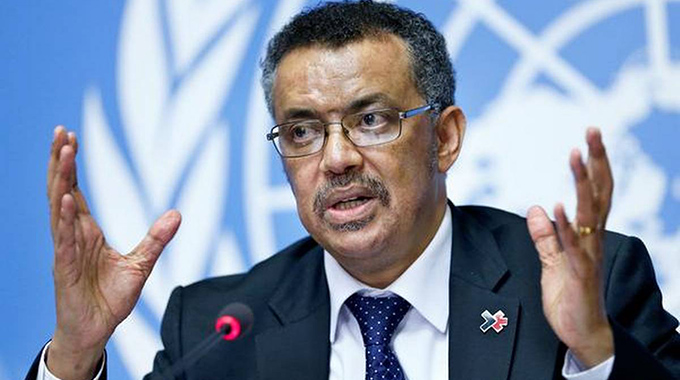
Paidamoyo Chipunza Senior Health Reporter
Restrictions imposed to control the spread of Covid-19 should be lifted only if health systems have capabilities to test, isolate, treat and trace every contact, World Health Organisation (WHO) director-general Dr Tedros Ghebreyesus has said.
As of yesterday, Zimbabwe had 23 confirmed cases and three deaths after five of the 23 samples tested in Bulawayo were positive.
Dr Ghebreyesus said countries should lift the restrictions if the transmission of the virus is controlled and ensure that outbreak risks are minimal in specialised settings such as nursing homes and health institutions.
There should also be preventive measures especially in places where people converge such as workplaces and schools.
He said countries must ensure that imported risks are managed while communities are educated, engaged and empowered to adjust to the new norm.
This comes as Zimbabwe was working with experts to get critical information that would be used to determine whether or not to continue with the lockdown which exempts those offering essential services.
Said Dr Ghebreyesus: “Some countries and communities have now endured several weeks of social and economic restrictions. Some countries are considering when they can lift these restrictions. Others are considering when to introduce them.
“On both cases, these decisions must be based on protecting human health and be guided by what we know about the virus and how it behaves. We are all learning all the time and adjusting our strategy based on the latest available evidence.”
WHO wants all countries to be implementing a comprehensive set of measures to slow down transmission and save lives.
In terms of lifting the restrictions in Zimbabwe, Secretary for Health and Child Care Dr Agnes Mahomva said the Government had started working with experts compiling data on the impact of Covid-19.
She said the data, compiled through modelling approaches, would be used to study and understand the burden of the disease.
The information would be used to recommend the way forward regarding the lockdown from a scientific and practical point of view.
“The lockdown in Zimbabwe was really to help us strategise how we can better prepare against Covid-19, but in addition to that, it was also looking at issues of managing transmission — both imported and local transmissions and we are happy about what we have done so far.
“Next steps, we are now working with experts to get information that speaks to Zimbabwe, not what is happening elsewhere. This data will tell us whether to continue shutting down the whole country or to focus on certain areas.
“It will also tell us if there are any additional measures that we should put in place but our ultimate goal is to reduce transmissions,” said Dr Mahomva.
Zimbabwe is in the third and final week of the 21-day lockdown where the movement of people has been restricted, except those offering essential services.
The lockdown officially ends on Sunday.
